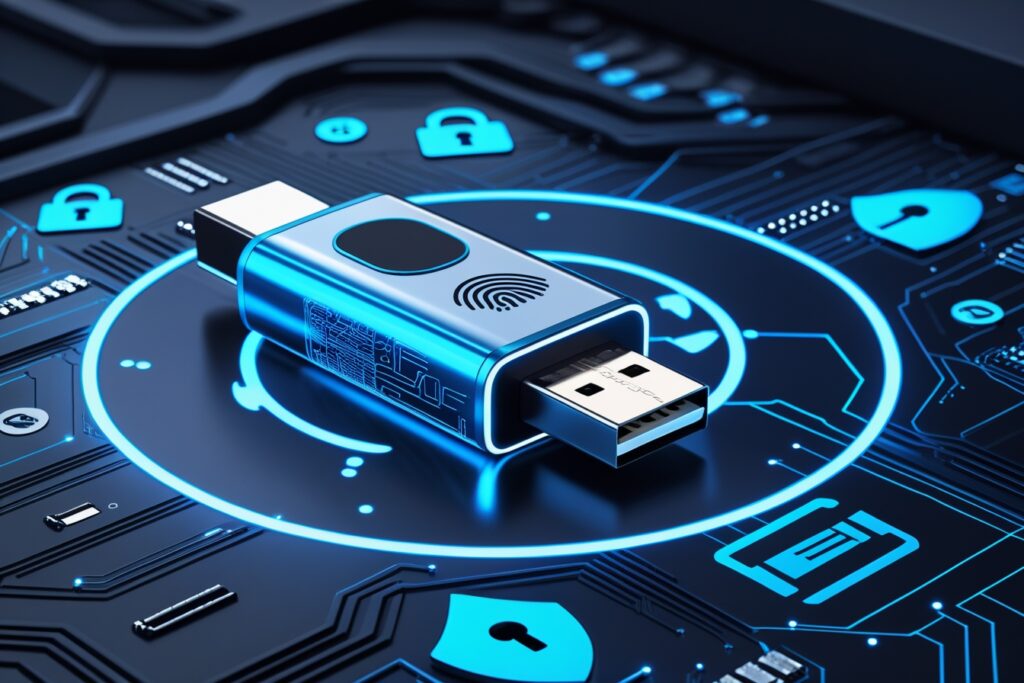Encrypted USB Drives for Journalists
Introduction
In an age where digital security threats are on the rise, journalists face increasing risks in handling sensitive information. Whether conducting investigative reporting, protecting confidential sources, or working in high-risk areas, data security is a top priority. Encrypted USB Drives provide a secure and reliable way to store and transfer sensitive information without fear of unauthorized access. In this guide, we will explore why encrypted USB drives are a must for journalists and how to choose the best drive.

Why journalists need encrypted USB drives
1. Protecting sensitive information
Journalists often handle sensitive files, including interviews, legal documents, and whistleblower leaks. If such data falls into the wrong hands, it can affect investigations and put sources at risk. Encrypted USB drives provide a strong layer of security by encrypting files, ensuring that only authorized users can access data.
2. Preventing unauthorized access
Traditional USB drives can easily be lost or stolen, leaving stored data vulnerable to breaches. Encrypted USB drives use hardware-based encryption, which ensures that even if the device is lost, data remains secure through strong password authentication and encryption algorithms.
3. Compliance with security standards
Many industries, including journalism, need to strictly adhere to data protection laws and ethical guidelines. Encrypted USB drives meet compliance requirements such as (GDPR and HIPAA), making them an ideal choice for journalists who need to handle confidential information securely.
1. Hardware vs Software Encryption
Hardware encryption: is more secure because it encrypts data at the device level, making it less vulnerable to hacking attempts.
Software encryption: relies on installed programs and may be susceptible to malware or cyber attacks.
2. Password Protection and Multi-Factor Authentication (MFA)
A strong password or biometric authentication (such as fingerprint scanning) adds an extra layer of security, preventing unauthorized access.
3. Self-Destruct Feature
Some advanced encrypted USB drives come with a self-destruct function that erases data after a number of failed login attempts, keeping sensitive information safe in case of theft.
4. Compatibility and Portability
Journalists often work on different devices and operating systems. Choosing a USB drive that supports “Windows, macOS, and Linux” ensures seamless usability.
5. Durability and Tamper Resistance
Since journalists often travel and work in challenging environments, investing in a drive that is “shockproof, waterproof, and tamper-resistant” is crucial for long-term reliability.
Top Encrypted USB Drives for Journalists
1. Kingston IronKey D300
Key features:
Military-grade encryption
FIPS 140-2 Level 3 certified
Tamper-resistant metal casing
2. Apricorn Aegis Secure Key 3NX
Key features:
PIN authentication with onboard keypad
No software required
Automatic data wipe after failed attempts
3. SanDisk Extreme Pro Secure USB
AES 256-bit encryption
Fast data transfer speeds
Lightweight and portable
Best practices for using encrypted USB drives
1.” Back up data regularly” Store copies in a secure cloud or offline location to avoid data loss.
2. “Use strong passwords” Avoid common passwords and consider using a password manager for added security.
3. “Keep firmware updated” Make sure your USB drive is up-to-date to protect against firmware vulnerabilities.
4. “Avoid public computers” Using an encrypted USB drive on a shared or public system can expose your data to potential threats.
5. “Keep your drive physically secure” Always keep your drive in a safe place and don’t leave it unattended.
1. What is an encrypted USB drive?
An encrypted USB drive is a storage device that uses encryption technology to protect data from unauthorized access. It ensures that only users with the correct password or authentication can access stored files.
2. Why should journalists use encrypted USB drives?
Journalists handle sensitive information, such as confidential sources, legal documents, and investigative reports. Encrypted USB drives provide an extra layer of security, preventing data breaches, unauthorized access, and potential legal risks.
3. How does encryption protect my data?
Encryption converts your data into a coded format that can only be unlocked with a correct password or authentication method. This prevents hackers, thieves, or unauthorized individuals from accessing your files, even if the USB drive is lost or stolen.
4. What is the difference between hardware and software encryption?
Hardware encryption: Built into the USB drive itself, making it more secure and resistant to hacking attempts.
Software encryption: Requires a program to encrypt data, which may be vulnerable to malware or cyberattacks.
5. Can encrypted USB drives work on any device?
Most encrypted USB drives are compatible with multiple operating systems, including Windows, macOS, and Linux. However, some models may have specific software requirements. Always check compatibility before purchasing.
6. What happens if I forget my password?
Many encrypted USB drives have no password recovery option to maintain security. If you forget the password, you may lose access to your data permanently. Some models allow password resets, while others use a factory reset feature that erases all stored data.
7. Are there encrypted USB drives with biometric security?
Yes! Some high-end encrypted USB drives include biometric authentication, such as fingerprint scanning, for an added layer of security.
8. What is a self-destruct feature on an encrypted USB drive?
Some advanced encrypted USB drives automatically erase all stored data after a certain number of failed login attempts. This prevents unauthorized access in case of theft or tampering.
9. Are encrypted USB drives legal to use?
Yes, encrypted USB drives are legal. In fact, they help journalists comply with data protection regulations like GDPR and HIPAA when handling sensitive information. However, in some countries, encryption laws may require users to provide access to authorities if requested.
10. How do I choose the best encrypted USB drive?
Look for the following key features:
✔ AES 256-bit encryption for strong security
✔ Hardware encryption for better protection
✔ Multi-factor authentication (MFA) such as passwords or biometrics
✔ Durability (shockproof, waterproof, and tamper-resistant)
✔ Compatibility with multiple devices and OS
